02 Oct 2023
After a period on the sidelines, could now be the time that institutional investors reconsider their tactical and strategic UK equity allocations?
CONTRIBUTORS | Michael Browne, Chief Investment Officer Martin Currie
Times have been tough for the UK since 2016 when pollers marginally voted to leave the European Union. Investors fearful of hampered international trade and sluggish growth shunned the region en masse, and strategic asset allocations followed suit (figure 1). But today the economy demonstrates many unique characteristics which, after a period of strong relative returns for the FTSE, may lead institutional investors to reconsider their tactical and strategic UK equity allocations, and could attract capital flows into the region.
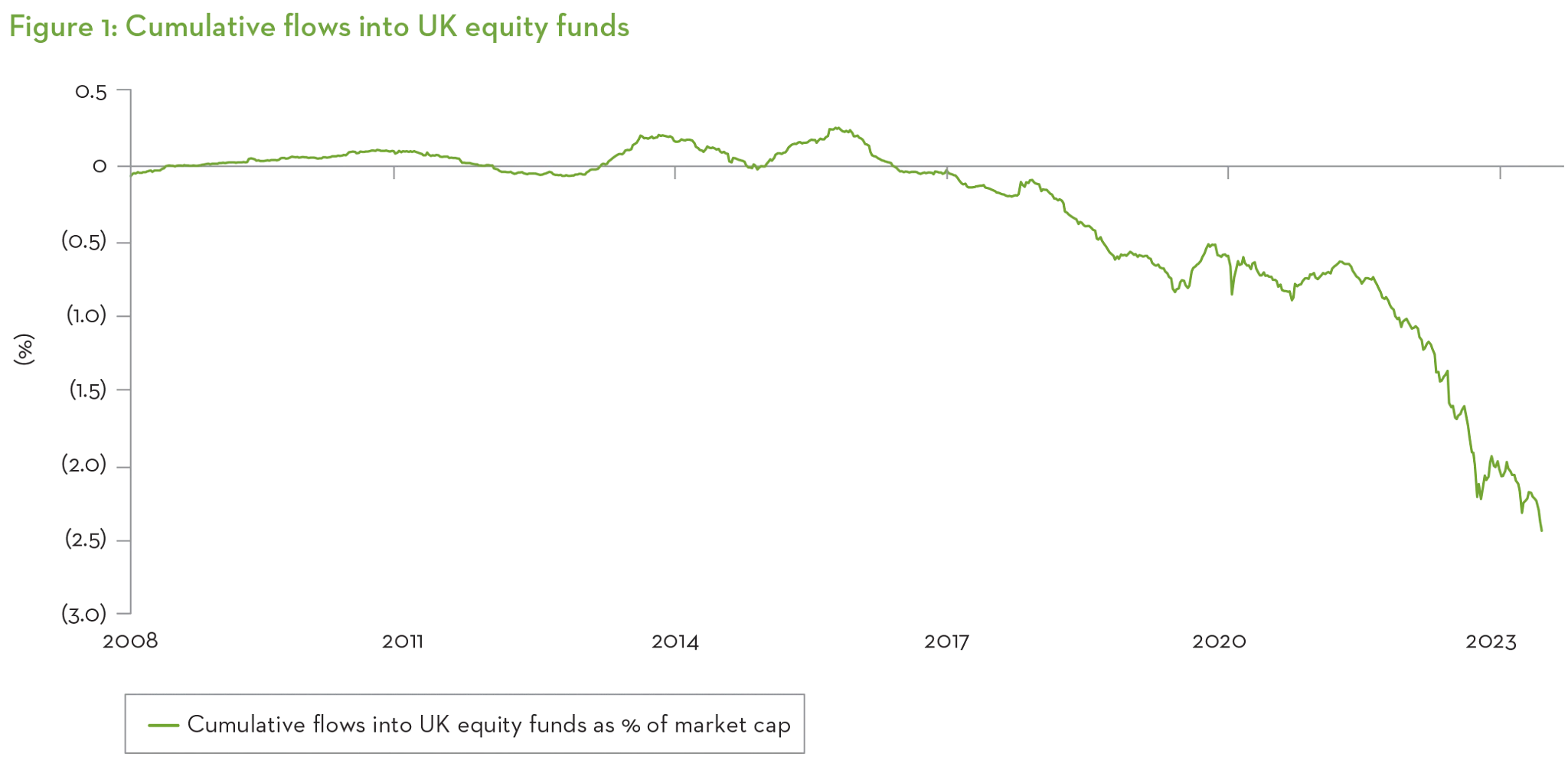
Source: Credit Suisse, 28th June 2023.
We must be aware of the inflation story within the UK where core inflation is defying global trends, exceeding both the Eurozone and the US. A significant contributor to this pain is the degree of private sector wage growth within the UK, which after a period of moderation is now starting to accelerate and is up at 8.2%. In real terms however, wage growth does remain negative although this is expected to turn positive later this year should inflation abate as expected (figure 2).
Green shoots may be appearing – the latest UK core inflation print came in below analysts expectations which delivered an instant bounce in the UK equity market, but core goods still increased 6.9% year-on-year which remains eyewatering relative to other developed regions. With economists estimating that wage growth of around 3% is necessary to curb inflation, a moderate overshooting from central bankers can be expected and base rate expectations are now settling at somewhere around 6%. We must remain mindful of the impact that wage growth has on government finances. With tax thresholds remaining flat for many years now, an increase in real wages provides greater income to the government as employees breach new tax brackets, thus delivering a marginal improvement to national finances (holding all else constant).
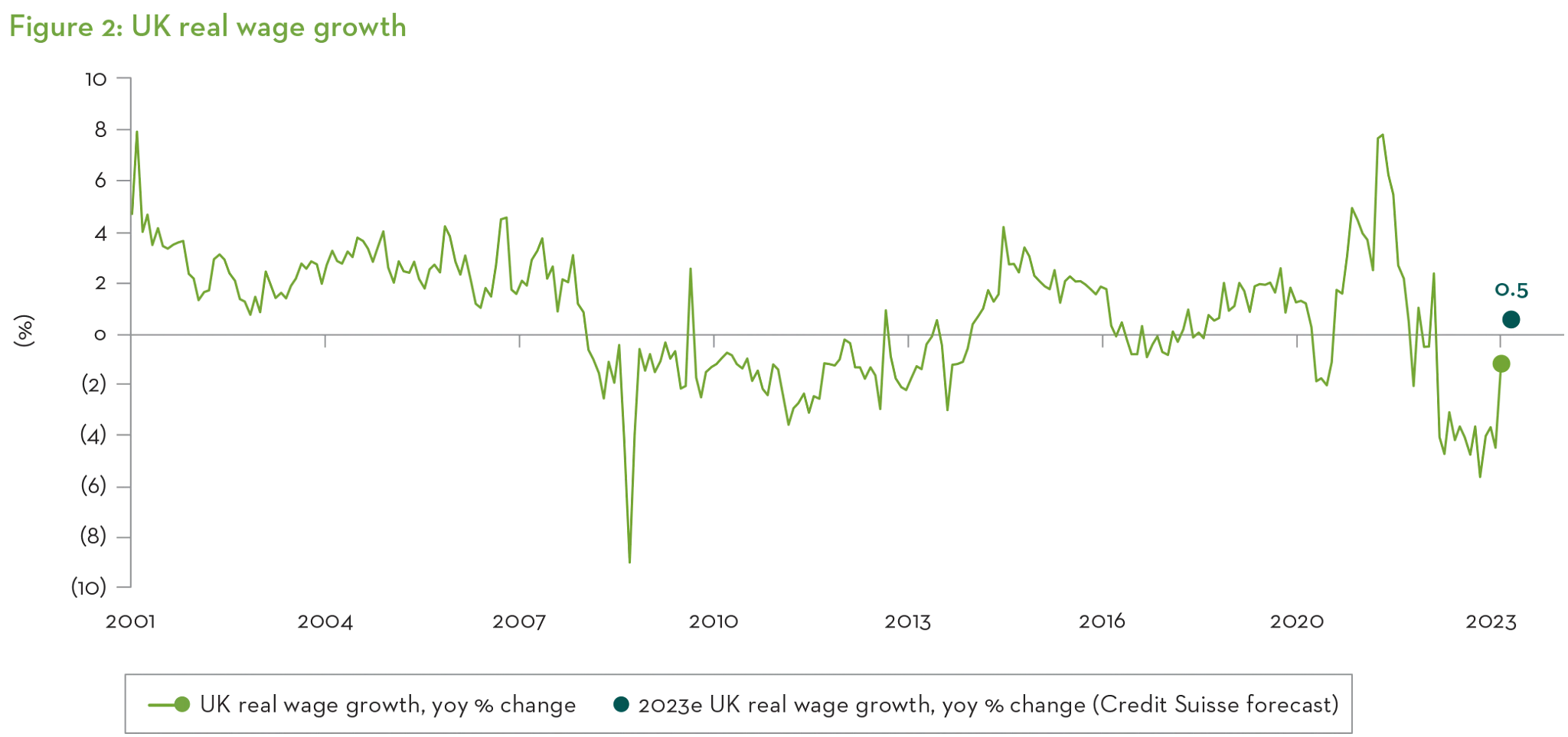
Source: Credit Suisse, 28th June 2023.
At first this interest rate trajectory would seem disastrous for already squeezed consumer budgets, but we believe that retailers will reap reward in the months ahead as consumer confidence continues to demonstrate resilience (figure 3).
Grocery price inflation looks to have peaked as shoppers change their purchasing habits, real wage growth should turn positive by the end of this year which partly offsets the impact of rising debt costs, excess savings remain close to all time highs very high relative to history despite some depletion since 2020, and online sales as a percentage of total sales are back to their pre-pandemic trend – all supportive of the retailers which constitute a large proportion of the FTSE 350 index.
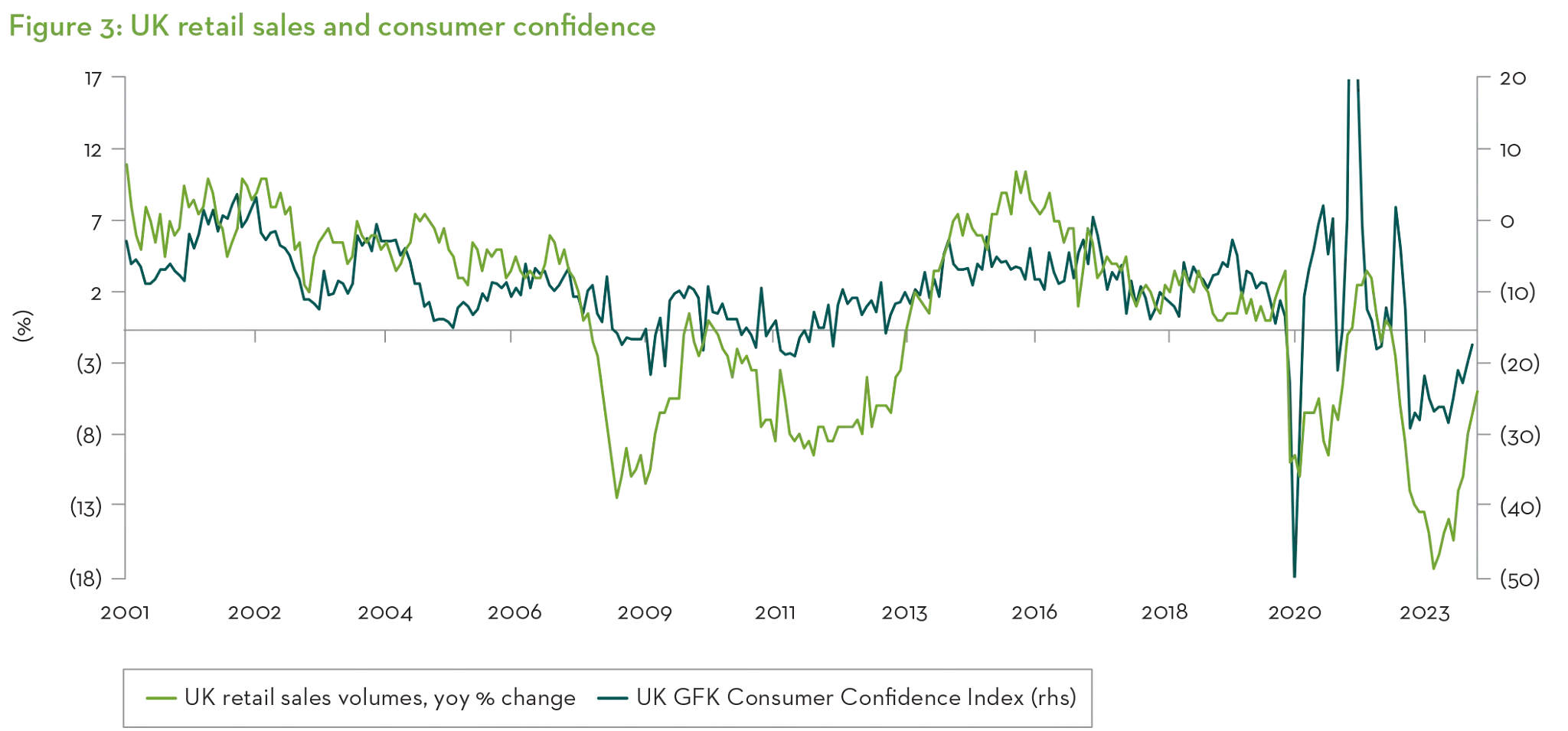
Source: Company data, Credit Suisse estimates.
Rising interest rates impact the UK consumer in many different ways – credit cards, loans, and mortgages to name just three. But the degree of interest rate sensitivity is not universal across the economy. In fact, at present the UK is less rate-sensitive than it has been in the past. Only 28% of UK homes are financed with a mortgage, compared to near 40% in the 1980s. Only 18% of mortgages are financed on a variable rate and just 50% of mortgages would have repriced by the end of 2023.
Indeed, the majority of UK mortgages are financed on 5-year fixed rates. The message here is that an interest rate shock takes its time to feed through to the UK consumer (figure 4), and the structural characteristics of the UK housing market (limited supply, rising rents, strong wage growth) provides some protection against an immediate collapse in real property prices.
With banks reluctant to tighten credit conditions and the UK consumer still retaining excess savings of over 10% of GDP, a healthy buffer exists to defend against any extended turbulence. The government is not immune to the rising cost of debt either – the average term of government debt is around 5 years – therefore refinancing costs have multiplied. The short-term offset for the government is that sticky inflation increases VAT income, but the lagged effect of interest rate rises remains prominent and will drip through over time upon debt maturity.
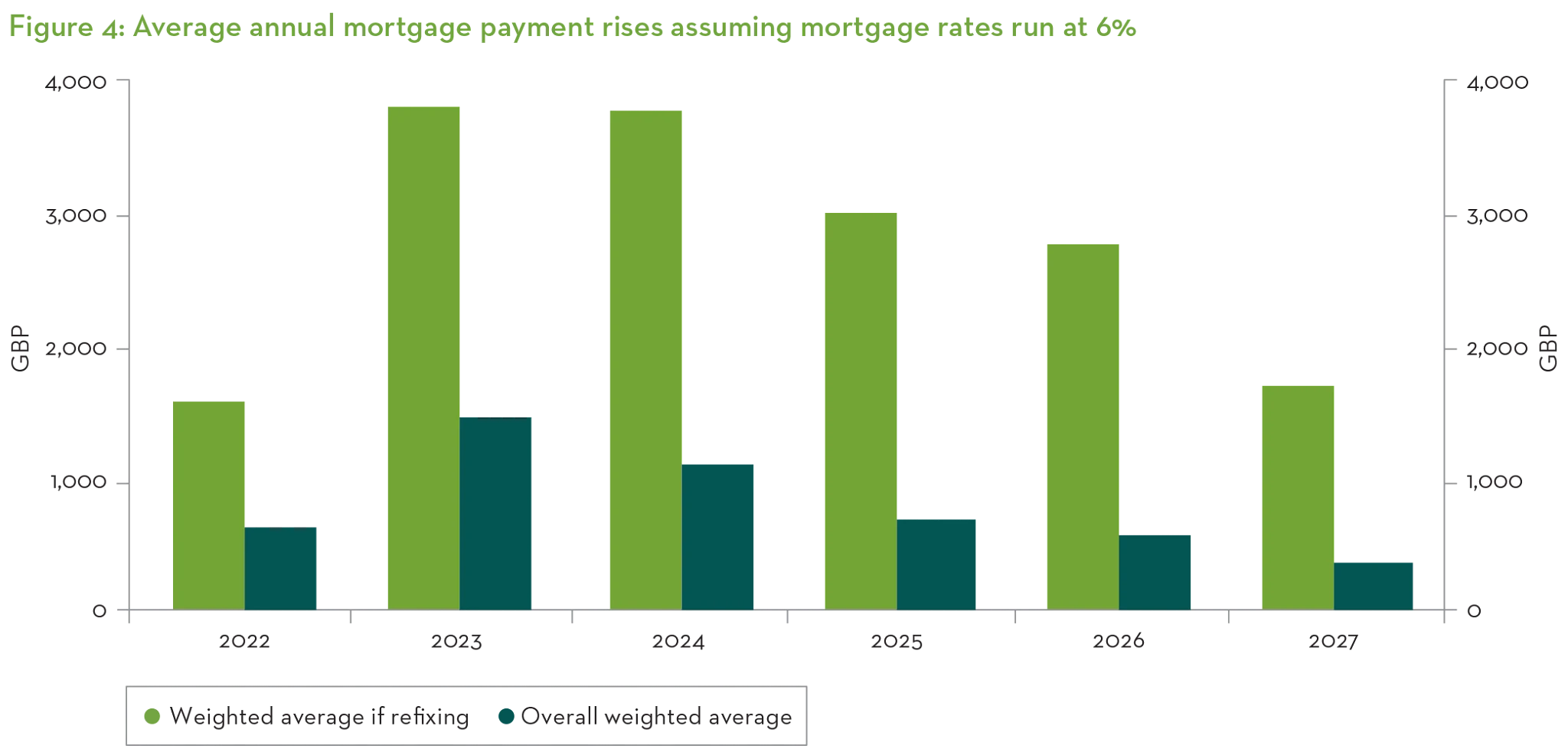
Source: HSBC, 25th June 2023.
Inward net-migration to the UK rose to an all-time calendar year high of 606,000 last year (figure 5). But the nature of immigration has shifted significantly from unskilled EU labour in favour of skilled, non-EU labour in recent years. This coincided with a historically tight labour market in 2022 but a disproportionate degree of vacancies exist in low-skilled jobs which were historically undertaken by EU workers. With skilled, non EU workers ineligible to take many of these positions due to visa conditions, it is no surprise to see these sectors contributing more to growing wage pressures thus inflation. Whilst the net skilled immigration is not totally offsetting this impact, there is a structural trend at play here.
Over the long term, skilled immigration increases the demand for the UK’s homes, goods, and services. Clearly this does not help the short term inflationary woes, but the contributions of migrants to the health service and various other sectors that they may work in, in addition to the tax paid on income and expenditure, supports the case for structural demand within the shores of the UK over the long term.
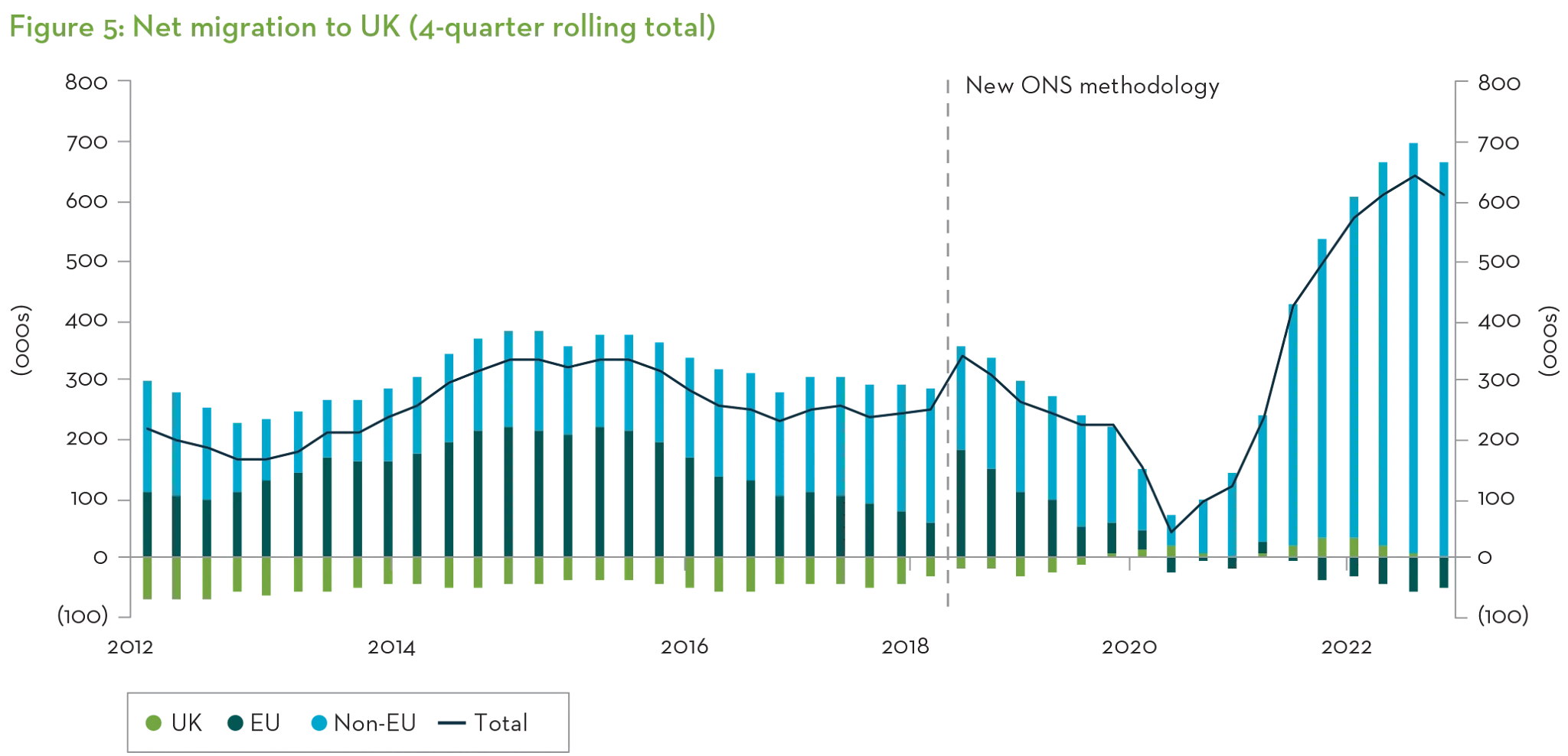
Source: HSBC, 30th May 2023.
Some facts may help set the scene – inflation is expected to be a problem in the UK (at least in the short term), government finances will improve at the margin as a result (all else held constant), consumers are confident, but the impact of rising interest rates will take some time to feed through to the economy, and the UK has been subject to an insurge of skilled immigration.
Clearly there are opposing forces at play here but our view is that the perceived ‘negatives’ for the economy are cyclical/transient factors that can be managed. Tackling the inflation problem, interest rates will likely remain modestly higher for longer and the economy will adapt to a ‘new normal’ base case, supported by consumer confidence and excess savings. We must remain mindful that a stronger economy often means higher rates.
On the other hand, the ‘positives’ are secular – improved national finances and structural demographic shifts may enhance long term demand within the region for domestic and international investors alike. The recently announced Mansion House package is set to reform financial markets through renewed investment in UK plc, aiming to attract £50bn into high growth UK assets by 2030 and re-assert the LSE as a primary listing venue for rapidly growing corporations. Although a nascent concept, the tailwinds that this could present are significant with aspirations to transform the UK into a research-intensive innovation hub, a far cry from the ‘old economy’ perception that the market has earned in recent years.
UK equity relative valuations are near their all-time lows. We are of the view that the market is discounting an excess of bad news based on cyclical forces that are set to pass, potentially overlooking the region’s long term attractiveness. When myopy peaks, the opportunity for attractive future returns is arguably at its greatest.
WHAT ARE THE RISKS?
All investments involve risk, including possible loss of principal. The value of investments can go down as well as up, and investors may not get back the full amount invested. Stock prices fluctuate, sometimes rapidly and dramatically, due to factors affecting individual companies, particular industries or sectors, or general market conditions. Special risks are associated with foreign investing, including currency fluctuations, economic instability and political developments. Smaller and newer companies can be particularly sensitive to changing economic conditions. Their growth prospects are less certain than those of larger, more established companies, and they can be volatile. Actively managed strategies could experience losses if the investment manager’s judgment about markets, interest rates or the attractiveness, relative values, liquidity or potential appreciation of particular investments made for a portfolio, proves to be incorrect. There can be no guarantee that an investment manager’s investment techniques or decisions will produce the desired results.
This material is intended to be of general interest only and should not be construed as individual investment advice or a recommendation or solicitation to buy, sell or hold any security or to adopt any investment strategy. It does not constitute legal or tax advice.
The views expressed are those of the investment manager and the comments, opinions and analyses are rendered as at publication date and may change without notice. The information provided in this material is not intended as a complete analysis of every material fact regarding any country, region or market. All investments involve risks, including possible loss of principal.
Data from third party sources may have been used in the preparation of this material and Franklin Templeton ("FT") has not independently verified, validated or audited such data. FT accepts no liability whatsoever for any loss arising from use of this information and reliance upon the comments opinions and analyses in the material is at the sole discretion of the user.
Products, services and information may not be available in all jurisdictions and are offered outside the U.S. by other FT affiliates and/or their distributors as local laws and regulation permits. Please consult your own financial professional or Franklin Templeton institutional contact for further information on availability of products and services in your jurisdiction.
Issued by Franklin Templeton Investment Management Limited (FTIML). Registered office: Cannon Place, 78 Cannon Street, London EC4N 6HL. FTIML is authorised and regulated by the Financial Conduct Authority.
Investments entail risks, the value of investments can go down as well as up and investors should be aware they might not get back the full value invested.